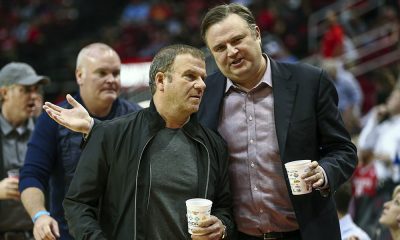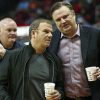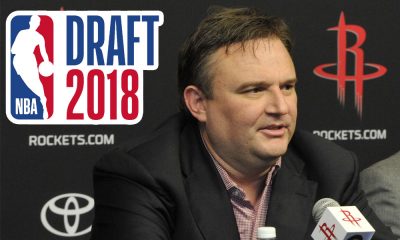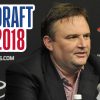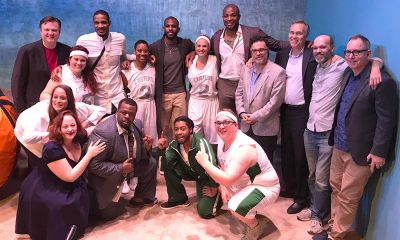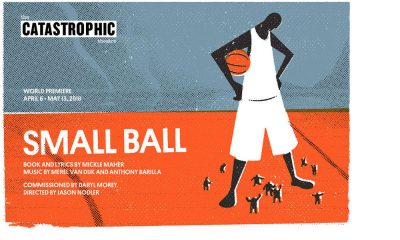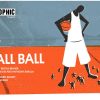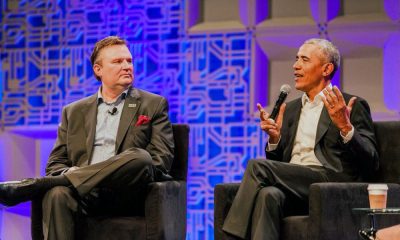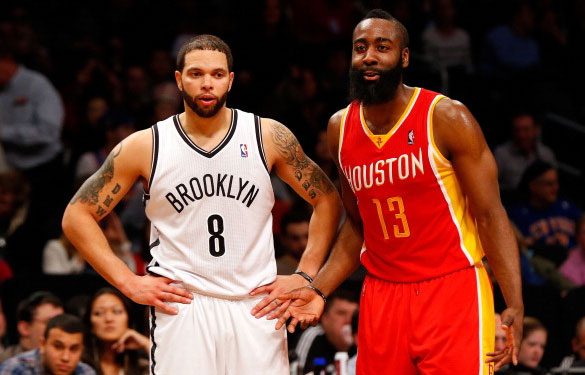Houston Rockets
Houston Rockets Salary Cap Update: 2018 Offseason Pre-Draft Edition
The complete breakdown of the Houston Rockets’ cap situation this summer — from how to acquire LeBron to the luxury tax bill that awaits.
Published
7 years agoon
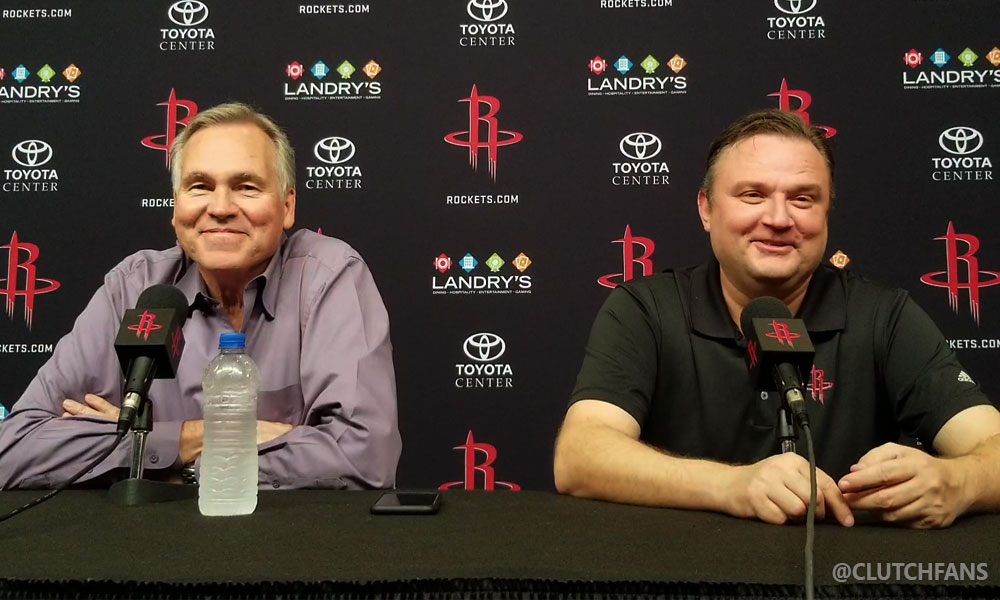
So close. SOOOO close!!!
The Houston Rockets finished their 2017-18 season with the league’s best regular season record and were one half of basketball (and a few made wide open 3-pointers) away from a Western Conference title and, quite likely, an NBA Championship. But with their season now over, the Rockets must look to the offseason for ways to maintain (and hopefully to improve) one of the greatest rosters in franchise history.
Player Salary, Exceptions and Available Cap Room
The Houston Rockets currently have the following player salary commitments, cap holds and salary cap exceptions available for the 2018-19 season (assuming that the league’s current projection of a $101 million salary cap is accurate): Player salary commitments: James Harden ($30.42 million), Ryan Anderson ($20.42 million), Eric Gordon ($13.5 million), PJ Tucker ($7.97 million), Nene Hilario ($3.65 million), Chinanu Onuaku ($1.54 million), Zhou Qi ($1.38 million, non-guaranteed), Aaron Jackson (team option for $1.38 million, non-guaranteed), Troy Williams ($122,741 dead cap hit – get used to this one), and RJ Hunter ($0 for cap purposes, as he is on a two-way contract).
Cap holds: Chris Paul ($35.35 million – Rockets hold full Bird rights), Trevor Ariza ($14.1 million – Rockets hold full Bird rights), Clint Capela (restricted free agent; $7 million – Rockets hold full Bird rights and a right of first refusal), Tarik Black ($3.95 million – Rockets have only Non-Bird rights), Luc Mbah a Moute ($1.5 million – Rockets have only Non-Bird rights), Gerald Green ($1.5 million – Rockets have only Non-Bird rights), Joe Johnson ($1.5 million – Rockets have only Non-Bird rights), and Markel Brown (potential restricted free agent; about $830,000 – coming off a two-way contract).
Other Salary Cap Exceptions: If Houston operates over the salary cap this summer (very likely given the cap holds of free agents the team would like to bring back), the Rockets will have access to the Mid-Level Exception (MLE), either the Non-Taxpayer variety ($8.57 million, the use of which would impose a hard cap at the “apron” level – currently projected at about $129 million) or the Taxpayer variety ($5.29 million). Houston will not be able to use the Bi-Annual Exception ($3.35 million), since they used it last summer on Black. In the unlikely event that the Rockets use cap room this summer, they could instead have the Room Exception of $4.41 million at their disposal.
Given their salary commitments, and based on current cap projections, the most cap room the Rockets could create (barring trades … yeah, I know) is about $18.38 million. This assumes that Houston renounces its rights to all free agents, doesn’t pick up its option on Jackson and waives Zhou. But since Paul and (likely) Capela are each worth at least that much as a free agent, it is unlikely that the Rockets operate below the cap without some extraordinary salary dump trades. And no, dumping Anderson’s contract alone will not create meaningful cap room on a Rockets team that still features Paul and Capela.
Some Internal Accounting As the Rockets prepare for the NBA Draft and the subsequent free agent season, there will be some internal maneuvering for GM Daryl Morey and his staff to do.
Houston will take less than 0.00001 seconds to extend a qualifying offer to Capela ($4.75 million, more than he’d otherwise receive based on his prior salary, due to meeting the “starter criteria” over the past two seasons) in order to make him a restricted free agent and to give the Rockets the ability to match any offers from other teams. More on that below. Extending the qualifying offer does not lower Capela’s cap hold.
The Rockets will also likely exercise their team option on Jackson (who is not trade-eligible until July 11 due to when he was signed), especially since his 2018-19 salary is non-guaranteed. While the 2017 CBA has changed the rules regarding how much non-guaranteed contracts can count for salary matching purposes, Houston and Jackson can always elect to amend his contract in order to guarantee his salary, in whole or in part, to the extent necessary to make a trade work.
The Rockets can make Brown – coming off a two-way contract – a restricted free agent by extending him another two-way contract for next year (with $50,000 guaranteed) as a qualifying offer. It is unlikely that the Rockets would match any offer of an NBA contract for Brown.
Draft Day Maneuvering… Or Not The Rockets will enter the 2018 NBA Draft armed with the 46th pick (from Miami, acquired in a draft night trade with Memphis last year), the full $5.1 million of their maximum cash allotment for 2017-18 to spend before July 1, as well as an assortment of players, draft rights and future picks to trade. However, the prospects for a significant draft night trade – something that the Rockets typically seek out – are pretty low.
Because Houston remains subject to a hard cap through June 30, the Rockets cannot exceed the 2017-18 “apron” level as a result of any draft night trade. That said, with the Rockets a good $7 million shy of the apron (and $1 million below the luxury tax threshold), the hard cap shouldn’t be a major impediment to a draft night trade. Houston might have some concerns about a draft night trade causing them to have to pay luxury tax, but that would only happen if the trade involves a substantial trade bonus. Of course, a trade could be agreed to in principle, with the actual consummation of that trade not going through until following the July Moratorium. More on that below.
Houston will be without its own first round pick (30th overall), which was sent to the Los Angeles Clippers in the big trade for Paul last summer. They are also without their second round pick (the 60th and final pick of the draft), which was sent to the Philadelphia 76ers in a trade for Shawn Long’s non-guaranteed contract (one of many such trades the Rockets made last June in an attempt to exploit a loophole in the new CBA, which grandfathered in the ability to use pre-existing non-guaranteed contracts as salary filler in trades). The Rockets currently possess all of their own future first round picks (starting in 2019) and all of their own second rounders (starting in 2020).
As for the draft pick Houston does hold, the Rockets could go in a number of directions. They could elect to use the pick on a player to add to their 15-man roster for next season. However, this is a veteran team in “win-now” mode, so adding rookies to the 15-man roster may not be ideal. Also, last year’s second round pick, Isaiah Hartenstein, agreed to play last season for the Rio Grande Valley Vipers on a G-League contract (for far less than he could have made playing in Europe), so it is possible that Hartenstein may be given a shot at one of those 15 roster spots. They could instead use that pick on an international draft prospect to stash overseas for a year or two. Perhaps the Rockets decide to select a player who has agreed before the draft to sign a two-way contract for next season (a tactic employed by several teams last year), even if that player is not the best talent available at 46. The Rockets could also look to move up in the draft – something they often try to do – although don’t expect them to move up very far.
Although Houston still has $5.1 million in cash to spend in trades, don’t expect Rockets owner Tilman Fertitta to open his pocketbook significantly on draft night. As was the case last year, that cash may be earmarked for a possible series of big trades in late June. Houston might use a portion of that cash to dump a small salary like Onuaku’s, although the team may prefer to keep his salary on the books until all major trade scenarios – some of which may require his salary as filler – are exhausted. More likely, Fertitta may just hold onto that cash, given the massive luxury tax bill that awaits him after next season. Internal Free Agent Decisions
Perhaps more so than in any other offseason in recent memory, the decisions relating to Houston’s own free agents will have far and away the largest impact on the Rockets’ offseason.
Chris Paul: When Paul chose to exercise his $24.6 million player option last summer in order to facilitate his move to the Rockets, he turned down the chance to make as much as four years, $149 million as a free agent (or possibly as much as five years, $201 million with the Clippers). There were likely several teams out there willing to give Paul such a contract. The Rockets and Paul may have had an “understanding” that he would be made whole the following summer. The question is, what would that mean? Is Houston going to offer Paul a max contract that would pay him $158 million over four years (or $205 million over five years)? Was the enticement of championship contention – not to mention no state income taxes – enough to get Paul to lower his long-term asking price? Another complicating factor here is that Paul is still the President of the National Basketball Players Association, so he may not want to set a “bad example” by give the Rockets any sort of discount. This one is going to be very interesting and could impact other moves the Rockets make over the next several years.
Clint Capela: Few players did more to improve their free agent stock than Capela this past season. At the start of the season, he was a promising young big who might get a decent contract but would probably be a victim of an over-saturated free agent center market. But now, after a great regular season and an even better playoff run, Capela might just be the top free agent center on the market. As a restricted free agent, the Rockets will have the right to match any offer for Capela. Capela could command an offer sheet as large as four years, over $108 million. While that is a rather steep price to pay, Capela is an ideal center for the Rockets’ system on both ends, and there is no way to replace him with a comparable player if they do not match. While few teams will have the cap room available to offer Capela a huge deal, two teams to watch out for are the Phoenix Suns and the Dallas Mavericks. Here’s hoping the Suns and Mavs each select centers in the top 5 picks of the upcoming draft (which features several terrific center prospects like DeAndre Ayton and Mo Bamba), making it less prudent for them to sign yet another young center to a max (or near-max) long-term deal. Another option is for the Rockets and Capela to work out a long-term deal before July 1, thereby avoiding the risks of restricted free agency for both parties.
Trevor Ariza: Ariza is the glue that has held the Houston Rockets together for the past four seasons. He has been the quintessential “3-and-D” guy, typically guarding the opponent’s best perimeter player or mobile big. Every NBA team needs a player like Ariza. The Rockets will be tested this summer on the value they place on a soon-to-be 33-year-old small forward whose defensive skills have been slowly diminishing. Ariza also happens to be very close friends with both Harden and Paul, so there are relationship issues in play here as well. Ariza’s value on the open market is uncertain. Given his age and the scarcity of teams with the cap room to spend on role players (even really good ones), it is not clear whether Ariza could command much more than the Non-Taxpayer MLE elsewhere, though he might be able to get more (annually) on a shorter-term deal. Plus, as with Capela, the Rockets’ inability to adequately replace Ariza if he leaves may force the Rockets to overpay him. Luc Mbah a Moute: Mbah a Moute was an absolute steal in free agency last summer for Houston, who landed him for the veteran’s minimum salary. Unfortunately for the Rockets, they only have Non-Bird rights to him, meaning that the most they can offer Luc (without using cap room or another salary cap exception) is 120% of the veteran’s minimum salary for next season. The estimated veteran’s minimum salary next season for a player with ten or more seasons of experience is about $2.37 million, so 120% of that would be about $2.85 million. But given his performance this past season (ill-timed shoulder injury aside), Luc might command well in excess of that in free agency. The Rockets might need to throw most or all of the Taxpayer MLE at Luc in order to keep him. Houston will be hoping to convince Mbah a Moute to take less to remain a valuable piece of a contender.
Gerald Green: Green was one of the feel-good stories of the entire 2017-18 NBA season. Mere days away from retiring after “sitting on a couch” for several weeks (I’m guessing he did other stuff, but they only seem to report about his couch-related activities), Green went quickly from emergency wing depth to rotation player and eventually to invaluable seventh man in the Western Conference Finals. A proud Houston native (as evidenced by his pre-game attire and his fantastic hairdos), Green was one of the fan favorites this season. As with Mbah a Moute, the Rockets only have Non-Bird rights to Green. However, given his issues with defensive consistency (something that has plagued him his entire career), it is unlikely that Green will have the same market that Mbah a Moute will in free agency. While the Rockets will likely try to bring Green back, they may balk at offering more than the veteran’s minimum. (On the subject of offering veteran’s minimum deals, Houston will be hesitant to offer two-year deals, since the league will pick up the amount above the two-year vet minimum salary – estimated at $1.5 million – on one-year deals only. That difference paid by the league is also excluded for salary cap and luxury tax purposes, so the relative value of a one-year deal is greatly magnified when facing an enormous tax bill.)
Joe Johnson: Johnson was added late in the regular season after being bought out of the last year of his prior contract. Expected to provide valuable bench scoring, Johnson was rather disappointing in his stint with the Rockets. “Iso Joe” was simply too slow to effectively run the switch-everything defense that propelled Houston to the Western Conference Finals. Just like with both Mbah a Moute and Green, the Rockets only have Non-Bird rights for Johnson. If he is brought back at all, it is unlikely he will be offered more than a one-year veteran’s minimum deal.
Tarik Black: Black had a disappointing season in Houston. There were flashes of the defensive fundamentals that had allowed him to stick in the NBA, but Black was far too foul-prone whenever he got extended minutes. Between his overall performance and Houston’s glut of backup centers on the roster, it is unlikely Black will be on the Rockets next season. However, that doesn’t necessarily mean that the Rockets will not re-sign him. While Houston only has Non-Bird rights to Black, his decent-sized prior salary make him an intriguing sign-and-trade candidate if the Rockets need salary filler in trades. Black could be re-signed to a three-year deal (only the first year of which must be guaranteed) starting as high as $3.95 million. That could be the difference in accomplishing a major blockbuster trade.
Markel Brown: As noted above, it is unlikely that Brown will return on an NBA contract. He remains a possibility to return on a two-way contract, although it seems more likely that the Rockets will explore other options for that two-way roster spot. Sergio Llull: You had to know I’d drop a Llull reference at some point during this thing, didn’t you?! While not technically a free agent (since the Rockets hold his exclusive NBA rights), Llull – a 6-3 combo guard and the 2017 EuroLeague MVP – remains an intriguing internal option in the Rockets’ long-term roster building plans. Llull’s team (Real Madrid) just won yet another EuroLeague title recently, and he has nothing left to prove playing in the world’s second best basketball league. While it is highly doubtful Llull finally comes over to Houston this summer (there are neither the dollars nor playing time available on this particular roster to entice him to leave his personal paradise in Madrid, plus he’s fresh off an ACL tear that cost him nearly the entire 2017-18 season), he remains an option in 2019 or, more likely, 2020. In the alternative, Llull’s draft rights probably still have trade value – perhaps being worth about a high second rounder – and may need to be surrendered in one of the Rockets’ bigger moves this summer.
#Pursuit of Outside “Free Agents”
In his end-of-season press conference the other day, Morey noted, “We’re going to have the pick of the free agents out there, whether they be the high-end ones or whether they be the Luc Mbah a Moutes and Gerald Greens of this year.” When pressed to explain how adding a high-end free agent would be possible in light of his declaration that the Rockets hoped to bring back all their own key free agents, Morey played coy and jokingly referenced “new math” that would make it happen.
Well, let’s take a look at that new math.
With little (and most likely no) salary cap room available, and with any sign-and-trade of a free agent to Houston imposing a hard cap that would make it difficult to keep the team’s core together, it seems that the most plausible way of adding a high-end “free agent” is for the Rockets to acquire that player via trade before he ever even becomes a free agent. The Rockets and Chris Paul shocked the NBA world on June 28, 2017, when Paul surprisingly picked up his player option –avoiding free agency altogether – and accepted a trade to Houston. This “opt-in-and-trade” avenue now seems much more obvious in hindsight. Let’s take a quick look at a couple of high-end players who can either hit unrestricted free agency this summer or pick up the player option on their existing contract: LeBron James and Paul George.
Bring In the King
The Rockets would do just about anything to acquire The World’s Greatest Basketball Player.
Even as he is playing in his eighth consecutive NBA Finals (and fourth consecutive Finals with the Cleveland Cavaliers), there is a very real concern in Cleveland that LeBron will leave the Cavs (again) this summer. If he picks Houston as his preferred destination, Morey and the Rockets will move mountains to try to make it happen. The last time LeBron left Cleveland (in 2010, when he embarrassed himself and the entire City of Cleveland on an ill-advised televised special), the Cavs nevertheless agreed to sign-and-trade him to Miami in order to salvage something from the loss of their star. The Rockets will be hoping the Cavs are similarly inclined this time around, especially after LeBron brought a championship to Cleveland during his latest stint with them. Interestingly, based on current cap projections, LeBron can actually make slightly more in 2018-19 by opting into the final year of his deal with the Cavs (at $35.61 million) than the largest starting salary he could get in free agency ($35.35 million).
Any trade for LeBron will need to include Anderson or Gordon, possibly both. (For those trying to add up salaries, the Rockets will need to send out at least $26,548,568 if they consummate a trade prior to July 1, or at least $28,406,375 if they make a trade after July 1.) If Anderson is not included, then any trade will need to include Gordon, Tucker and a whole bunch of smaller salaries. If Anderson is included, he (along with potentially significant assets) may need to be sent to a third team. Gordon could possibly headline the package going to the Cavs. Further complicating matters is that Cleveland recently traded for George Hill and Jordan Clarkson – two guards with large 2018-19 salaries – making Gordon less enticing as a player asset. The Cavs team salary is so high that they’ll be well over the salary cap even if LeBron walks for nothing; but they also will not want to pay a bunch of luxury tax for a LeBron-less team. The Rockets could possibly find yet another team to take on Gordon in exchange for (less expensive) assets that can be sent to Cleveland, but trades are much more likely to fall apart the more teams get added to the mix.
For those into pipedreams, there is a scenario in which the Rockets could trade Anderson, Nene and non-rotation players (possibly including a signed-and-traded Tarik Black) for LeBron, without having to give up any of Houston’s key rotation pieces. But the amount of future draft assets it would take to pull off such a trade is nearly unfathomable. Without fathom.
Getting all the stars to align to bring LeBron to Houston will be an extremely difficult task, one that is not very likely (despite what the Vegas odds-makers may speculate). But that won’t stop the Rockets from trying like hell to make it happen.
A PG-13 Feature?
While not quite the caliber of superstar that LeBron is, George represents the ideal wing to play alongside Harden and Paul: a souped-up combination of Gordon’s offense and Ariza’s defense. He is also still only 28 years old. An opt-in-and-trade for George would involve at least two fairly large obstacles. First, the option year on George’s current deal pays him only $20.7 million, a far cry from the $30.3 million starting salary he could command as a free agent. Would George make the same sacrifice that Paul made last season in order to play on a legit contender (rather than with his hometown Los Angeles Lakers, who will certainly offer him the max)? Second, any trade for George would need to involve the cooperation of the Oklahoma City Thunder. The last time the Thunder and Rockets made a big trade, the Thunder didn’t exactly come out of it smelling like roses. Will Sam Presti and company be willing to trade one of their top two players to a Western Conference rival?
A trade for George would almost certainly start with Gordon. His salary is close enough to George’s that only a little filler (a couple of minimum guys) would be necessary to match salaries. If George is truly ready to bolt for the Lakers – which would leave OKC with nothing – perhaps the Thunder would view Gordon as an adequate consolation prize who can contribute to their ongoing quest to revive their Western Conference relevancy.
#Pursuit of Outside (Actual) Free Agents
The best signifier of whether Morey’s free agency comments prove prescient will probably be how they use the Taxpayer MLE.
With an estimated maximum starting salary of $5.29 million and topping out at three years, just under $16.7 million, the Taxpayer MLE hardly represents the type of payday that most really good free agents covet. However, there are some veterans – many of whom have already gotten at least one big payday – who will take less in order to contend for a title. The allure of a rotation spot on a title contender may also draw several potential “MLE-caliber” free agents to Houston as vet minimum signings, just as Mbah a Moute and (later) Johnson were drawn to the Rockets.
I will leave it to others (or at least won’t cover it here) as to which particular (non-star) free agents the Rockets will seek out. Besides, this article is pretty damn long already! Maybe in the next article…
Luxury Tax Galore!
If Houston only brings back its core guys (Paul and Capela, in particular) – let alone adding more salary via trades or outside free agency – the Rockets’ team salary is going to drastically increase. Fertitta will have to cut a massive check to the league office after next season (and likely beyond) in order for Houston to field a contending roster going forward.
The luxury tax – an attempt by the league to promote parity – is a punitive penalty imposed against teams whose payrolls exceed the salary cap by a certain amount. The luxury tax threshold for 2018-19 is currently estimated at $123 million. The luxury tax rate starts at 150% and escalates with each additional $5 million in team salary above the tax threshold. Using an illustration employed by Clutch here, if Paul gets a max contract, Capela gets a max offer sheet that Houston matches, Ariza gets a deal starting at $10 million, Mbah a Moute gets the full Taxpayer MLE and the rest of the roster is filled out with vet minimum salaries, the Houston Rockets’ team payroll could be as high as $285 million, including about $124 million in luxury tax! The highest marginal luxury tax rate for that roster would be 525%!
While this illustration is a bit extreme, it is quite likely that the Rockets will find themselves in a less-pronounced version of this situation. It is also why – absent a major trade that requires significant matching salary – Houston may look to dump Anderson’s salary this summer, even if it costs the team some significant assets to do so. The Rockets may have to use most or all of their 2018-19 cash allotment (an estimated $5.2 million) as part of such a salary dump. That cash could instead be employed to a lesser extent to dump some smaller salaries (such an Onuaku’s).
Another option for the Rockets is to waive Anderson and stretch his salary over several seasons, but this is a very unpalatable option and should be explored only as a last resort. If Anderson is waived and his salary stretched prior to September 1, his salary would be a dead cap hit of approximately $8.34 million . . . for each of the next five seasons. While such a move would save Fertitta a lot of money over the next two seasons, it could have extremely negative consequences for the team once this roster is ready to be turned over and cap room is needed. Even if Anderson agrees to a buyout, or even with the potential for setoff (if Anderson signs with another team in the next two years), that dead cap hit is unlikely to be reduced by much. It would be foolish to expect Anderson to give back much money in a buyout arrangement; and it would be surprising if he received a very lucrative contract from another team in a bad free agent market this summer.
Regardless of what the Rockets do next season to mitigate their luxury tax woes, they will likely need to do something before or during the 2019-20 season, when Harden’s Designated Veteran Player Extension (signed last summer) finally kicks in. Next summer, Harden’s salary will soar to $37.8 million, causing Houston’s luxury tax bill to skyrocket (pun very much intended).
It could be worse, though. Fortunately, by avoiding the luxury tax in 2017-18, the Rockets would not be subject to the “repeater tax” (an additional 100% tax on top of each marginal luxury tax bracket) until the 2021-22 season at the earliest. Conclusion
After a remarkable season in which the Houston Rockets fell just short of an NBA title, the task at hand for the franchise is clear: try to keep this core together while also seeking improvement via trades and free agency. Whether an improvement as drastic as a LeBron or George is realized, only time will tell. But even absent such an acquisition, there is room for improvement as the Rockets run it back for another championship gambit.
It’s just going to cost Tilman Fertitta a heck of a lot of money to do so.
Houston Rockets
Looking Back on the Trade for Phoenix’s Draft Picks
Are the Rockets set to cash in on Phoenix’s downfall or could a Suns retool murky the waters?
Published
3 weeks agoon
March 12, 2025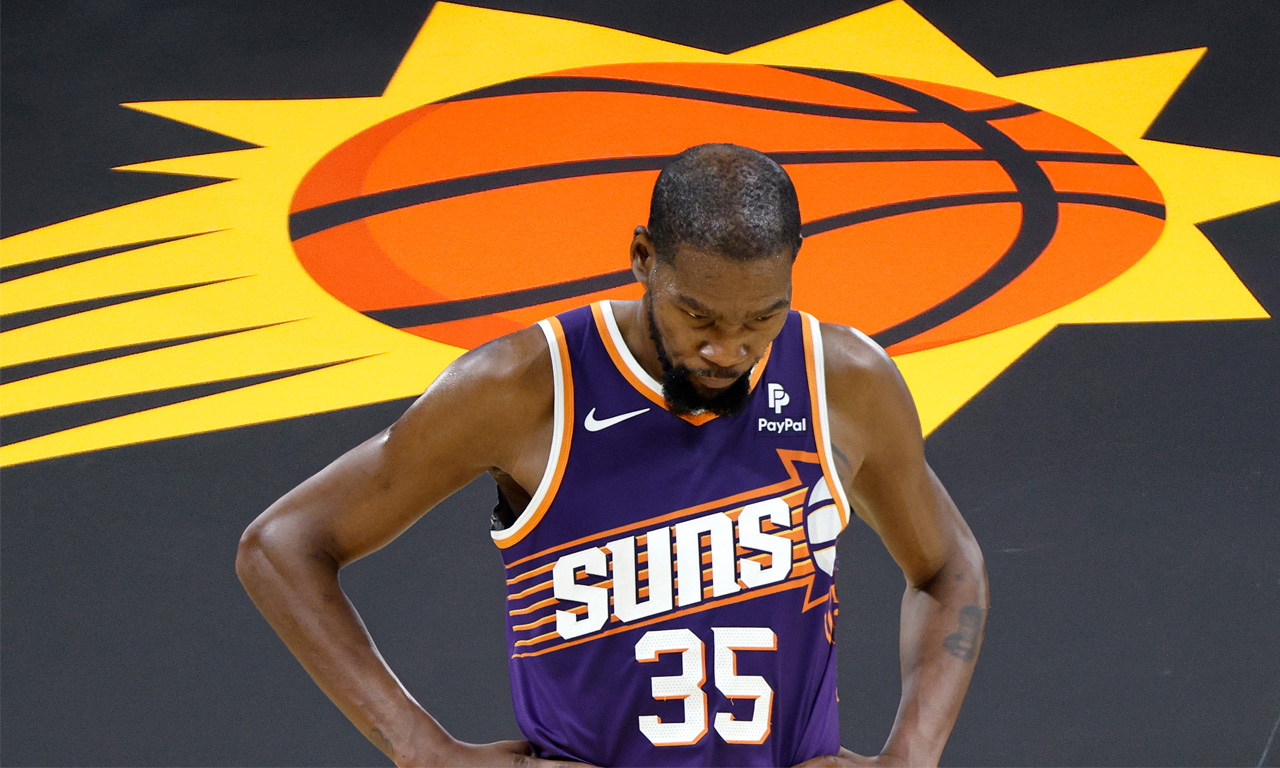
As the Houston Rockets set to host the Phoenix Suns tonight, it seems the right time to take a look back at the trade that linked these two franchises together for the foreseeable future.
This past June, the Rockets made a trade with Brooklyn that sent back to the Nets control of their 2025 and 2026 unprotected first-round picks. In exchange, the Rockets received a large chunk of Phoenix’s future (2025, 2027, 2029) and control of the Dallas Mavericks’ 2029 first.
In essence, the Rockets traded one pick and one swap for two picks and two swaps. All unprotected.
Thoughts At The Time of the Trade
If I’m going to discuss the current outlook of this trade, I have to be honest about how I saw it at the time of the move. While I didn’t hate this trade initially, I definitely didn’t love it either.
I liked that the Rockets increased their overall trade assets. I also liked that they extended the timeline to be able to make a bigger trade and I also appreciated that they kept control of the 2027 Brooklyn swap.
But I didn’t like that the Rockets gave up what seemed like the more established value (Brooklyn) for a more uncertain gamble (Phoenix). The Rockets did not control a “tanking runway” of picks to offer back to Phoenix — all of the picks Houston got in the deal were in staggered years (’25, ’27, ’29). I also felt Brooklyn, who badly needed to rebuild, got away with paying market value to get their picks back despite the fact that the Rockets invested years in watching those picks appreciate up to the point that they had the Nets completely over a barrel.
Net-net: I felt like more certainty was traded for less certainty and it was more of an equitable trade for both teams rather than Brooklyn paying dearly to get back the things only the Rockets could offer.
There were two ways I thought this trade could pay dividends: The Suns needed to flame out immediately, as in this season (unlikely), or the Rockets could trade all those pick assets as part of a deal for a real superstar in the next 12-18 months (more likely).
In a testament to how quickly change can occur in a very unpredictable NBA, four things have happened that have been positive indicators for the Rockets in making this move.
The Suns are fading
While Phoenix had major salary cap issues, dealing with the second apron, they didn’t appear to have problems on the court. They jumped out of the gate 8-1 and looked like a legitimate contender behind their star trio of scorers in Kevin Durant, Devin Booker and Bradley Beal.
Given Houston controlled Phoenix’s pick this year via a swap, it looked like the Rockets would come up empty-handed on the trade this season.
That changed quickly.
Injuries, serious depth concerns and a lack of a defensive identity has sent Phoenix spiraling. Booker’s availability has been inconsistent, forcing Durant to carry the load, while Beal has not quite fit in at all. Their financial limitations, thanks to owner Mat Ishbia’s all-in spending spree, have handcuffed their ability to improve the roster around the three stars.
The Suns are sitting 11th in the West, having gone 22-34 since that hot start, and are currently trying to catch a depleted Dallas squad to get back into the play-in picture.
As of right now, the Rockets project to end up with a lottery pick (albeit a late one) this season out of the trade.
Phoenix was caught shopping Durant
Because the Suns struggled so hard after the start, they tried to make a major move at the deadline but could not unload Beal, in large part due to his no-trade clause.
As a result, they may have made a misstep: They openly tried to trade Durant, which inevitably became public news.
Now? Durant will almost assuredly be traded this summer — likely to a destination that he handpicks. This means the Phoenix Suns will have to look at all possibilities for their future, including potentially having to give Rafael Stone and the Rockets front office a call.
But keep in mind, the Rockets can not offer Phoenix the ability to completely rebuild via the draft right now. Phoenix’s 2026 pick is controlled by Washington. They would have to get extremely creative to set that stage. A retool in Phoenix is much more likely.
Could Brooklyn have been better than expected?
This one is tougher to gauge.
The Brooklyn Nets are currently tied for fifth-worst team in the league, giving them strong lottery odds this summer. This was expected. After all, the Nets, even with a healthy Mikal Bridges and a full roster, were not a good team last season, closing the year 20-41 in the final three quarters of the season. The Rockets ended up with the #3 pick (Reed Sheppard) as a result of Brooklyn’s mediocrity.
However, if the Rockets had not placed that pick back in Brooklyn’s hands, would the Nets be better than this?
Brooklyn brought in a new coach in Jordi Fernandez that has had a positive impact. They have dumped off players, such as Dennis Schroeder and Dorian Finney-Smith, that impacted winning. The bar to make the play-in in the East (.415 winning percentage) is obscenely low, with Brooklyn being just five wins away from it at the moment.
And on top of that, Brooklyn did have lots of draft capital that they could have moved to try to win now.
It’s very tough to say as you don’t know if a team with Bridges still in Brooklyn might have actually been worse than this current squad, but you could make a case that the pick the Rockets would have ended up with from Brooklyn this season would be eerily similar to the one they will end up getting from Phoenix this year.
Again, this is a tough call.
Nico Harrison Hooked the Rockets Up
As part of the trade, the Rockets got control of the Dallas Mavericks’ 2029 first-round pick (unprotected, of course). While there’s really no way of knowing what a pick will be five years out, we did know that Luka Doncic would be just 29-30 years old that season and it was fairly etched in stone that he would be the core piece of a Dallas squad that season.
Enter chaos in Dallas.
Doncic was shipped out in the trade that shocked the world, which could have a major impact on the Rockets. Dallas’ current core of Kyrie Irving and Anthony Davis will be 37 and 36 years old that season, respectively.
On paper, the value of that pick shot up.
Final Summary
Right now, the outlook on these picks looks strong. One source stated off the record that they feel the 2029 Phoenix pick is the best pick asset out there that is owned by another team. The Rockets would be reluctant to add that one specifically into any trade unless it’s for a truly legitimate star.
But if there is any lesson that the NBA teaches us over and over again, it’s that it’s very hard to predict where a team will be a year from now, much less three years from now.
Can the Rockets pressure Phoenix and leverage the ownership they have of their draft capital to get what they really want (Booker) from them? Could a Suns retool around Booker and Beal, with the right pieces and assets acquired from a Durant trade, significantly change their on-court outlook and cap sheet — which in turn could damage the value of the picks Houston controls?
Bottom line is it has worked out well this season, and the future forecast at the moment is promising. The current value of those future picks appears strong. What will likely determine history’s final grade for this trade will be how it sets them up for the trade to come, and that’s where fans will be looking to Stone and the front office for action starting this summer.
Houston Rockets
Amen Thompson’s ankle injury will be re-evaluated in one week
“The things he does you can’t replicate,” says Rockets coach Ime Udoka
Published
3 weeks agoon
March 10, 2025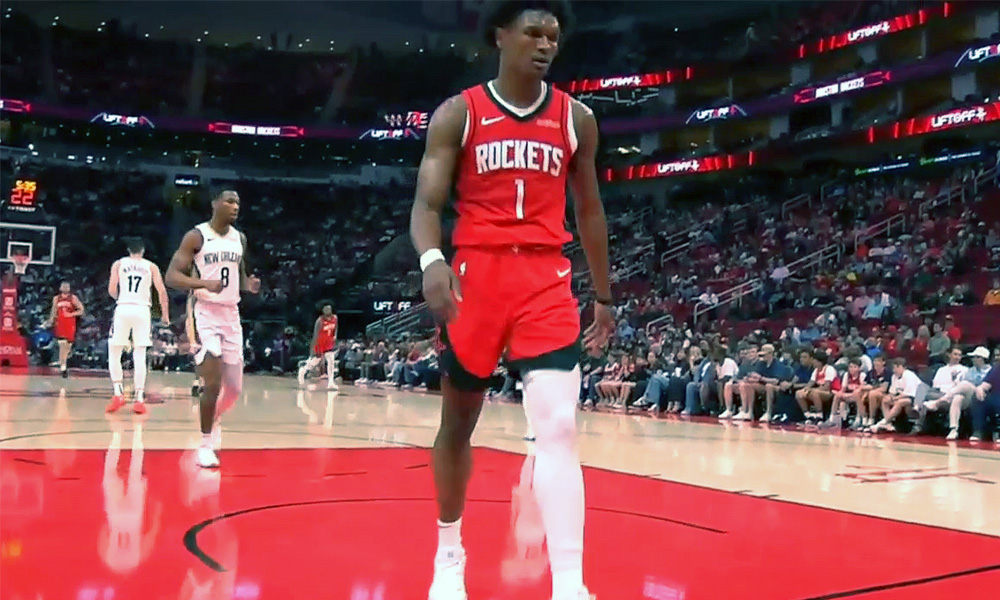
Rockets young star Amen Thompson will have his ankle injury re-evaluated in one week, according to Ime Udoka.
Thompson had an MRI on Sunday and the Rockets coach confirmed all imaging (X-ray, MRI) was negative.
“Just some swelling and pain, obviously,” said Udoka.
If you listen to Udoka, you can tell he knows how special Amen is to this team. He said the Rockets are missing a lot by not having him out there.
“Obviously, the things he does you can’t replicate,” said Udoka. “[Amen is] a guy that plays every position for us. When one goes down, he runs the point. If another is out, he runs the four.”
Amen is one of the best defensive players in the game, and as a one-on-one defender of guards/wings, he might already be the best in the league in just his second season. He’s holding his opponents to 40.5% shooting from the field, tops in the league.
“He’s a very unique defensive player,” said Udoka. “We got some guys that do some great things there, but I like to put him and Dillon on the best two usually, night to night. You got Tari and that’s a luxury as well, but the way he goes about it is different. His athleticism, size, speed, strength, shotblocking ability, steals… he’s all over the place.”
“Hard to replicate for sure.”
Amen injured his ankle late Saturday night in a blowout win against the Pelicans, but the unfortunate part was he probably should not have been on the floor in the first place.
The Rockets left Amen Thompson in the game in a blowout to get one more rebound for a triple-double and he just got injured. He's heading to the locker room with a limp. https://t.co/UBtrEpgWuU pic.twitter.com/D8GeKP8sQk
— ClutchFans (@clutchfans) March 9, 2025
The Rockets had built well over a 30-point lead by early fourth quarter. Jalen Green was able to rest the entire fourth. Alperen Sengun came out of the game with 7-8 minutes left while Dillon Brooks and Tari Eason came out with 6:00 left. But Thompson, who had posted an insane +39 on-off number, remained in the game because he was one rebound shy of a triple-double with 15 points, 11 assists and nine rebounds.
Udoka addressed that decision on Monday before the game against Orlando.
“What I typically don’t do is wholesale substitutions,” said Udoka of the decision to keep Amen in the game. “Albeit 30[-point lead] at six minutes [left] is different than losing to Minnesota, a 16-point lead with four minutes [left].”
“I’ve seen it go both ways in the past. You take out guys too early and have to bring starters back, and vice versa.”
Thompson has played in 60 games this season, five short of being eligible for postseason awards. He absolutely should be up for an All-Defensive nod this season so keep an eye on him getting back in time for that. He would need to return to action no later than April 4th for the game against the OKC Thunder in order to play enough games to be eligible.
Houston Rockets
How the Kyrie Irving Injury Impacts Rockets
Houston’s draft positioning and offseason plans could be impacted by Dallas
Published
1 month agoon
March 4, 2025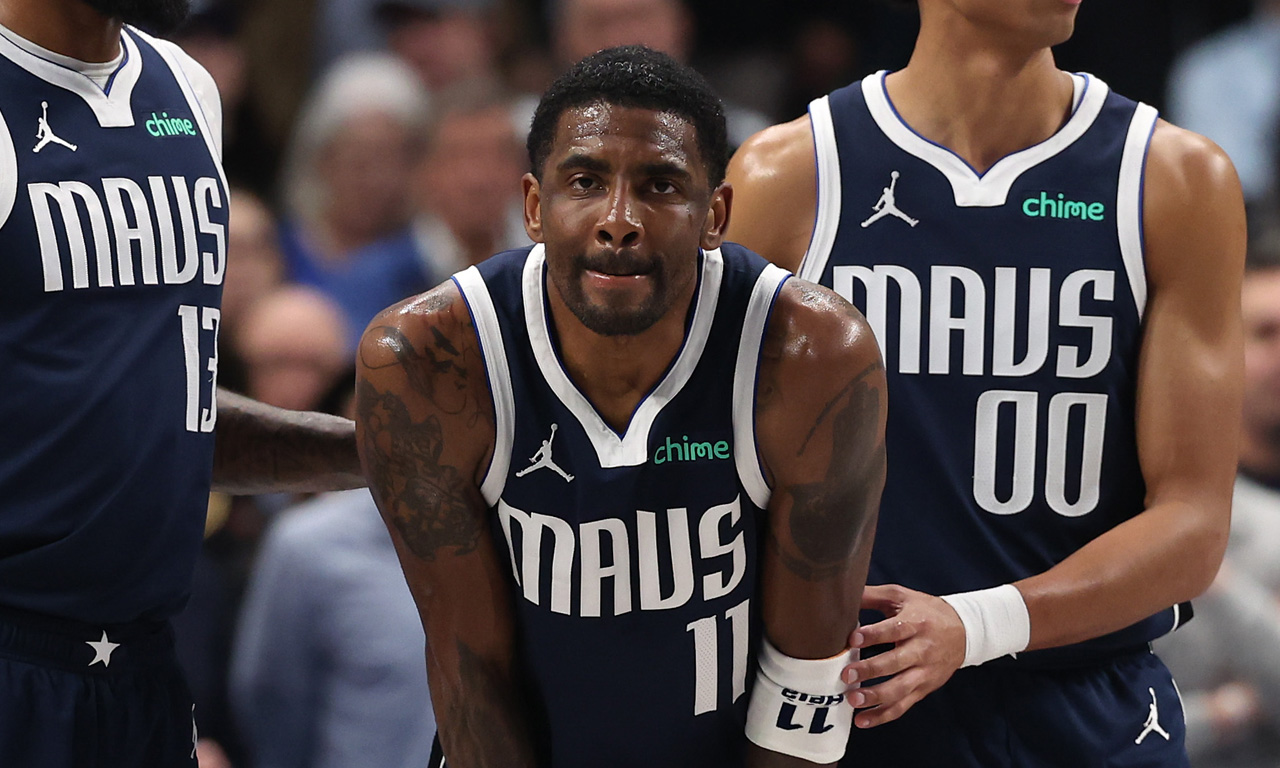
Dallas Mavericks guard Kyrie Irving was injured Monday night and the news dropped on Tuesday that the knee injury is serious — a torn ACL in his left knee that will end his season and a good portion of next season as well.
Brutal. I can’t think of an NBA team that imploded faster than the Dallas Mavericks.
You trade away a 25-year-old phenom who just hoisted you on his back en route to the NBA Finals a year ago. You cashed in that golden ticket to go all-in on a trio of aging stars in Kyrie, Anthony Davis, and Klay Thompson.
Bold strategy, Nico. Let’s see if it pays off.
(Narrator: It’s not paying off.)
The Mavericks had some interesting potential this year and maybe the next couple of years once everyone was healthy, but now? Their star guard is likely out until the calendar year 2026 and Klay and AD aren’t getting any younger nor more durable. The Mavericks may have actually swapped their future for a present that never arrives — and Dallas GM Nico Harrison has to be feeling overwhelming pressure right now.
So how does this impact the Rockets?
For starters, Houston has a game remaining on the schedule against Dallas on March 14th at Toyota Center — Davis may or may not be back for that game.
More importantly, Dallas is the 10th seed in the West at the moment, just 3.5 games ahead of the Phoenix Suns (11th seed). The Rockets control Phoenix’s first-round pick unprotected this season via a swap. We need as many West teams as possible ahead of Phoenix to keep them out of the play-in/playoffs and to push them as deep into the lotto as possible.
This complicates that. Phoenix’s remaining schedule is the toughest in the NBA by a good margin, with plenty of games left against the league’s best teams, so it still looks promising overall — but we’re talking about Kevin Durant, Devin Booker and Bradley Beal. They can still get hot at the right time while Dallas may struggle.
So keep a close eye on that. The good news is the Portland Trail Blazers are one of the hottest teams in the league and they are (shockingly) nipping at the Arizona squad’s heels.
Taking a look ahead to the offseason, the Kevin Durant Pursuit will be big.
This one is a little more complicated for Houston. The Rockets really want Devin Booker but, as of now, the Phoenix plan appears to be to trade KD this offseason and retool around Booker. The Rockets will have interest in Durant but they’re not going to sell the farm (prospects and all the picks) for a 37-year old like they would for Booker.
Three teams that I’ve heard a lot about from Rockets circles that will be in the mix are Houston, Minnesota and Dallas — Timberwolves and Mavericks have been considered the main competition. But, a lot of this will depend on Durant himself and where he wants to play at this stage of his career.
Keep in mind also, if the Suns are “retooling” around Booker and Beal (holding the no-trade clause), then they could be placing a higher priority on win-now players over the return of their own draft assets. The Rockets definitely have the best assets overall to offer up in any trade package between those three teams, but if Phoenix does prefer finding the right ready-to-win players around Booker/Beal, that gives Dallas and Minnesota a real chance.
This injury “may” take Dallas out of the equation, and they are/were definitely a contender for KD’s services given his past relationship with Kyrie and the way Dallas was positioned to win right now. Does KD at his age want to wait for Kyrie to be healthy?
And one last friendly reminder: The Rockets control that Dallas 2029 first (unprotected).
Houston Rockets
Rockets Sign David Roddy to Two-Way Contract
Former first-round pick has played with the Grizzlies, Suns and Hawks
Published
1 month agoon
March 3, 2025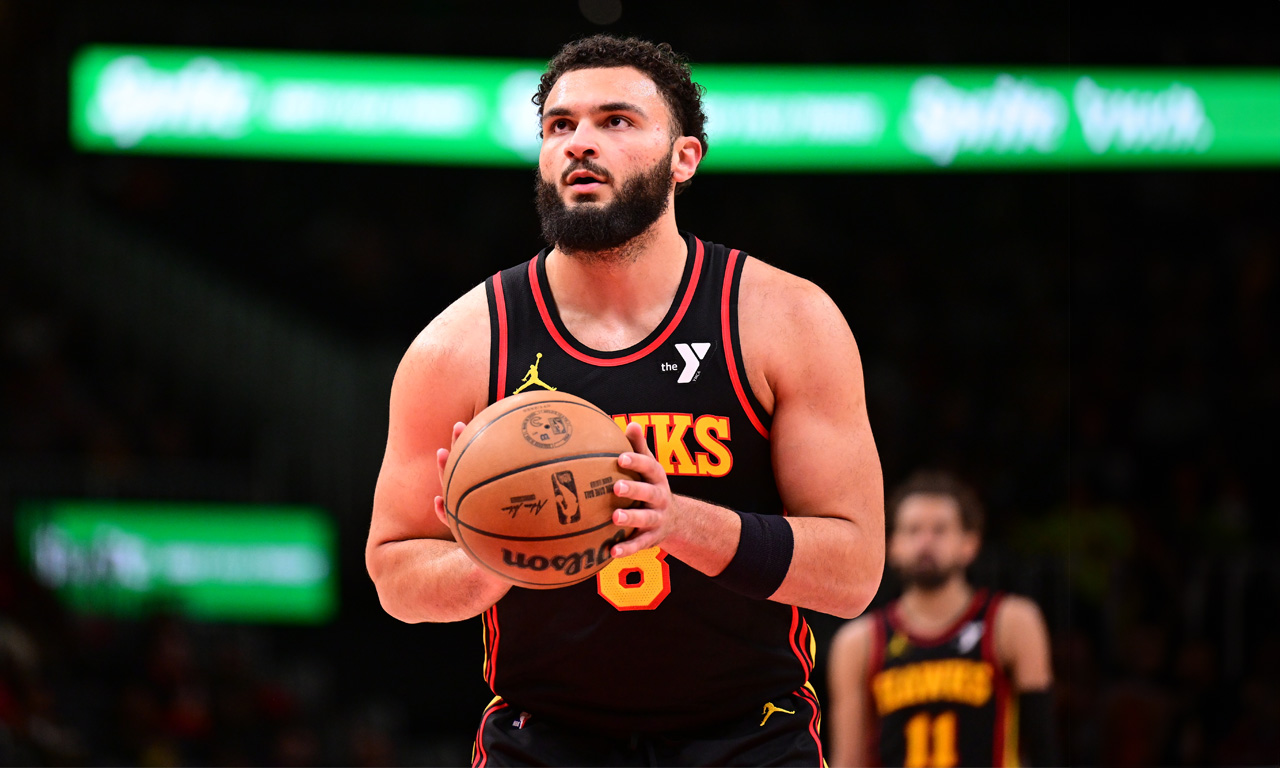
The Rockets made a move on Monday, signing former first-round pick David Roddy to a two-way contract.
The two-way spot opened up after the front office signed Jeenathan Williams to a standard four-year, $8.2 million contract (with friendly team options all along the way).
Roddy is 6-foot-5 and 250+ pounds but sports a 6-foot-11 wingspan. He was taken with the 23rd pick in the first round of the 2022 NBA Draft — six selections after the Rockets drafted Tari Eason. A standout in college, Roddy averaged 19.2 points, 7.5 rebounds, 2.9 assists, 1.2 steals, and 1.1 blocks per game during his junior season at Colorado State.
Roddy, who turns 24 later this month, is a physical player who can play multiple positions. He’s a solid rebounder for his size/position. He has played in 165 games over three seasons with the Grizzlies, Suns, Hawks and most recently Sixers, averaging 6.2 points and 2.9 rebounds per game.
The guard/forward has not shown efficient shooting, however — he’s a career 30.5% three-point shooter and just 68.4% from the line. His defense is better inside than out.
Ultimately, it will be those two things — three-point shooting and defense — that will determine his chances of carving out a consistent role in the league.
All in all, it’s a low-risk signing and the Rockets get a look at a prospect that fits their age timeline.
Houston Rockets
Houston a potential landing spot for Ben Simmons post-buyout?
Published
2 months agoon
February 6, 2025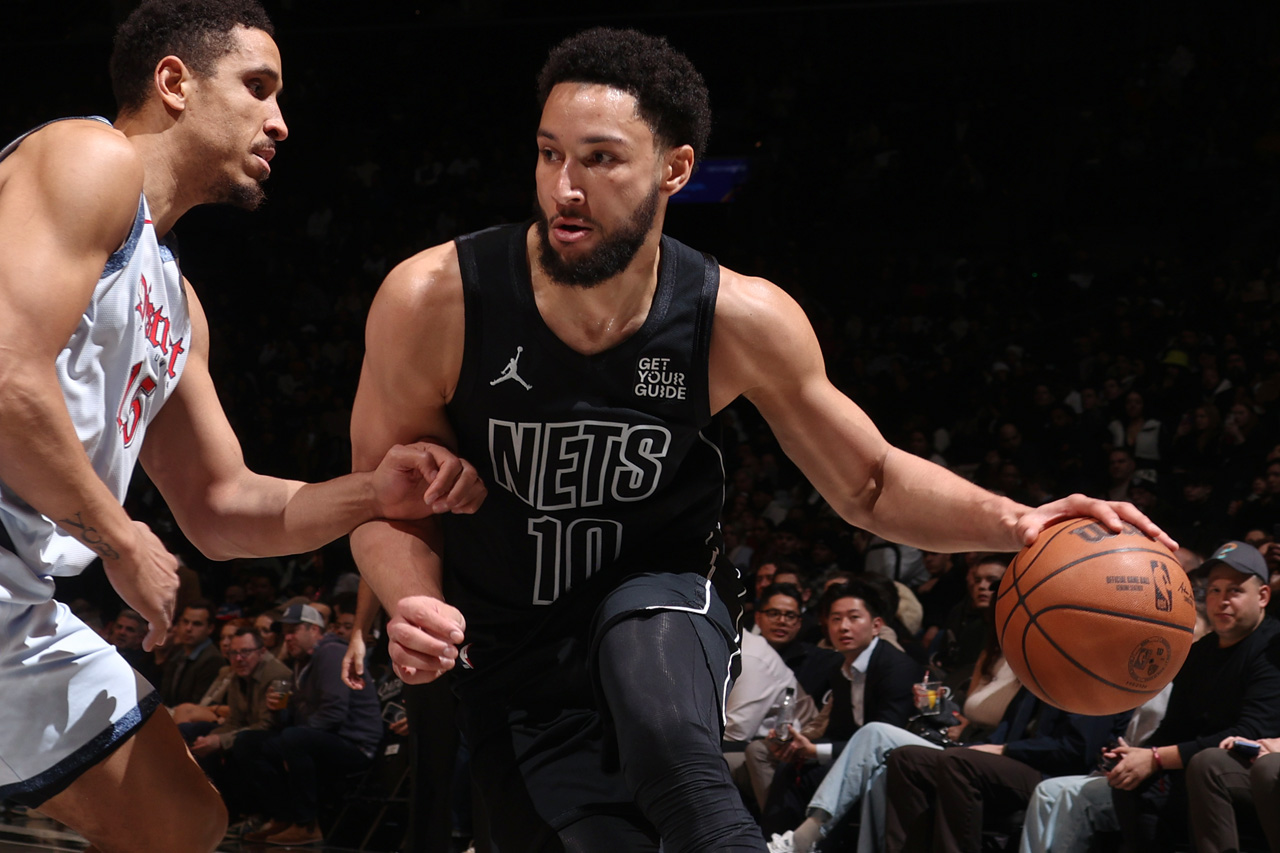
ESPN NBA analyst Brian Windhorst said on Thursday’s NBA Trade Deadline show that Brooklyn Nets forward Ben Simmons is working on a buyout and the Houston Rockets is a potential landing spot for him.
“Cleveland and Houston are two situations for Ben Simmons,” said Windhorst.
Brian Windhorst says the Cavaliers and Rockets are buyout locations for Ben Simmons.
Thoughts? pic.twitter.com/7ly4mvmxr5
— ClutchFans (@clutchfans) February 6, 2025
Advertisement
Rockets coach Ime Udoka was an assistant coach in Philadelphia in 2019-20 when Simmons was with the Sixers, before injuries took a significant toll. In fact, Udoka, when speaking about Amen Thompson earlier this season, brought up some comparisons to Simmons.
“The skill set is there, and it’s something that’s unique with his speed, athleticism, size, passing ability, and all those things,” said Udoka of Thompson. “I coached somebody, Ben Simmons, who had similar traits… as far as size and ability to push the pace, and find guys and finish. There are some similarities there.”
Both Thompson and Simmons are known for their elite athleticism, defensive versatility, and ability to create opportunities in transition.
However, can Simmons help the Rockets today? That’s the tough question.
Simmons has played in 33 games this season, averaging 6.2 points, 6.9 assists, 5.2 rebounds, 0.8 steals and 0.5 blocks in 25 minutes a night. He does not shoot threes (like, at all) — he has only attempted two threes in the past three seasons combined.
Ideally, he does not play in front of your young forwards of Amen, Tari Eason and Jabari Smith Jr. and on that basis alone, I think I would pass. But, Ime loves defensive dogs and he could use some extra ballhandling on the roster. You can see that there’s little in the way of offensive organization when Fred VanVleet is out.
There would be a comical full circle moment though if the Rockets did sign Ben Simmons, considering the Rockets were heavily criticized for trading James Harden in 2021 to Brooklyn instead of to Philadelphia for Simmons. The Rockets clearly made the right choice there.


